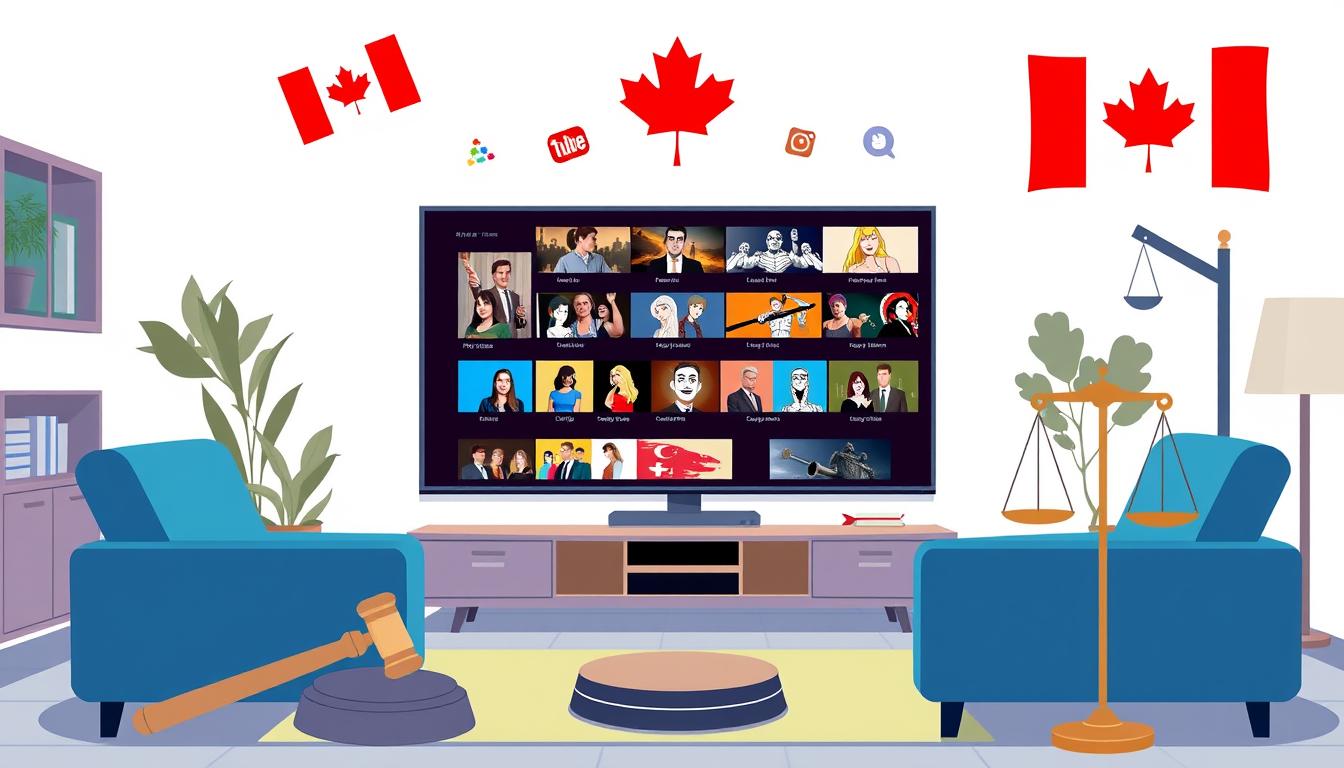
Is IPTV Legal in Canada? Know the Facts
Is IPTV Legal in Canada?
In Canada, the legality of IPTV (Internet Protocol Television) is a big topic. With more people streaming content online, it’s key to know the legal side of IPTV. This article will help clear up the confusion around IPTV’s legal status in Canada.
Key Takeaways
- The legality of IPTV in Canada is a nuanced and evolving landscape, with both legal and illegal services available.
- Consumers must be vigilant in distinguishing between legitimate IPTV providers and those operating in the legal grey area or illegally.
- Copyright and licensing concerns are at the heart of the ongoing debate around the legality of IPTV services.
- Regulatory bodies and internet service providers (ISPs) play a crucial role in shaping the legal framework for IPTV in Canada.
- Staying informed about the latest developments in IPTV legality and exploring legal alternatives can help consumers make informed choices.
Understanding IPTV and Its Legal Implications
IPTV, or Internet Protocol Television, is a new way to watch TV over the internet. It’s more flexible than traditional TV and has become popular. But, the law around IPTV is tricky, depending on where you get your content and who provides it.
What is IPTV?
IPTV uses the internet to send TV shows and videos to viewers. It’s different from old TV, which used broadcast signals or cable. With IPTV, you can watch live TV and on-demand content, like movies and sports.
The Legality Conundrum
The law on IPTV is complex and often talked about. Some IPTV services are legal, but others might not have the right to show certain content. The legality of IPTV changes based on the service and where you are.
It’s important for users to check if an IPTV service is legal in their area. Knowing the risks and laws can help you choose safely and avoid legal trouble.
“The legality of IPTV services can be a complex and ever-evolving topic, with nuances that vary depending on the specific provider and location.”
By keeping up with IPTV law updates, you can enjoy IPTV safely. This way, you can watch what you want without worrying about breaking the law.
Navigating Canadian Laws on IPTV
Understanding the legality of IPTV streaming in Canada is key. The laws and regulations for IPTV regulations and IPTV licensing are complex. They mix federal and provincial laws, affecting IPTV services.
The Broadcasting Act and the Copyright Act are important at the federal level. The Broadcasting Act deals with TV signal distribution. The Copyright Act covers copyrighted content use. IPTV providers must follow these laws to operate legally in Canada.
Some provinces also have their own rules. For example, Quebec has specific licensing for IPTV providers. These rules can differ from other provinces.
| Federal Legislation | Provincial Regulations |
|---|---|
|
|
It’s vital for both IPTV providers and users to grasp the legal landscape. Navigating these laws can be tough. But, it’s crucial to ensure IPTV services are legal in Canada.
“The legal status of IPTV in Canada is a constantly evolving landscape, with new developments and interpretations of the law occurring regularly.”
Is IPTV Legal in Canada?
The legality of IPTV in Canada is complex. There are legal IPTV providers, but using unauthorized services is risky.
Legal IPTV Providers
In Canada, many IPTV providers offer legal streaming. They follow Canadian laws and have the right licenses. Some legal providers include:
- Bell Fibe TV
- Rogers Ignite TV
- Shaw Direct
- Telus Optik TV
These providers offer many channels and features like DVR. They are safe choices for legal TV access.
Risks of Illegal IPTV Services
There are also illegal IPTV services in Canada. These services don’t have the right licenses, risking legal trouble. Using them can lead to:
- Legal problems: Users might face fines or criminal charges for copyright infringement.
- Unstable service: Illegal services can be unreliable, causing interruptions.
- Security risks: They might have malware, threatening your devices and data.
Canadian users should stick to legal IPTV options. This ensures they watch content safely and ethically.
IPTV Copyright and Licensing Concerns
IPTV services are getting more popular, but they come with copyright and licensing worries. IPTV lets users watch a lot of digital content, like live TV, movies, and TV shows. But, how this content is shared can lead to big iptv copyright issues and licensing problems.
Intellectual Property Rights
The content on IPTV is often protected by laws like copyright. Creators, broadcasters, and distributors have special rights to their work. Using this content without permission can break these laws. So, IPTV users need to know the legal risks of watching content without the right to do so.
- Using copyrighted content without permission can lead to legal trouble, like fines and lawsuits.
- IPTV providers who share content without the right agreements might also face legal issues from content owners.
- It’s key to respect intellectual property rights to help the IPTV industry grow and last.
To stay out of legal trouble, IPTV users should look for legal IPTV alternatives. They should make sure they’re watching content through legal and licensed ways. Knowing about iptv copyright issues and licensing helps users make smart choices. This way, they help the IPTV industry grow in a good way.
Exploring Legal IPTV Alternatives
In Canada, the rules for IPTV services are changing. People looking for legal options can find many choices. These services offer a wide range of content and make sure they follow Canadian laws.
Licensed streaming services like Netflix, Crave, and Amazon Prime Video are popular. They have lots of movies, TV shows, and documentaries. You can watch them whenever you want and get recommendations based on what you like. This model is affordable and reliable.
Traditional TV providers like Bell, Rogers, and Shaw are also good choices. They offer many channels, live sports, and on-demand content. These services are more expensive but are fully legal and regulated.
Sports fans might like NBA League Pass, NHL.TV, and MLB.TV. These services give you live games, highlights, and team content. They are legal and meet all the necessary agreements.
When looking for legal IPTV options, think about what you want to watch, how much it costs, and how easy it is to use. By looking at these factors, Canadians can find the best legal IPTV service for their needs. This way, they can enjoy their favorite shows and sports while following the law.
The Role of Internet Service Providers (ISPs)
In the world of IPTV, Internet Service Providers (ISPs) are key players. They control internet access and face big challenges with iptv regulations and iptv copyright issues.
ISP Responsibilities and Liabilities
ISPs are vital in making IPTV services available. They must ensure their networks can handle the extra bandwidth IPTV needs. They also have to watch for and stop any copyright problems or illegal activities on their networks.
ISPs have important duties in the IPTV world. These include:
- Ensuring their networks can handle the bandwidth IPTV needs
- Watching for and finding any illegal sharing of copyrighted content on their networks
- Working with content owners and authorities to solve iptv copyright issues
- Telling their customers how to use IPTV legally and ethically
- Putting in place steps to stop illegal IPTV use on their services
By doing these things, ISPs help keep the IPTV world in Canada fair and legal.
“ISPs are the gatekeepers of the internet, and they have a duty to ensure that their networks are not being used for unlawful activities, including the distribution of pirated IPTV content.”
As IPTV grows, working together will be key. ISPs, content owners, and authorities must team up to tackle iptv copyright issues. This will help keep the IPTV scene in Canada strong and legitimate.
IPTV Regulations and Enforcement Efforts
The fast growth of IPTV has made regulators and law enforcement in Canada take notice. They are looking into the legal side of this new technology. As more people want IPTV, worries about iptv piracy concerns are growing.
Canadian authorities are focusing on iptv regulations and laws against sharing content without permission. The Canadian Radio-television and Telecommunications Commission (CRTC) is checking if IPTV services follow the rules.
The CRTC wants to protect intellectual property rights. They make sure IPTV providers are legal. This means they watch unlicensed IPTV services closely and try to stop illegal content sharing.
- The CRTC has warned and taken action against unauthorized IPTV providers. They show the dangers of IPTV piracy.
- Law enforcement, like the Royal Canadian Mounted Police (RCMP), fight IPTV piracy too. They investigate and take legal steps against those sharing copyrighted content illegally.
- Groups like the Canadian Media Producers Association (CMPA) work with regulators and law enforcement. They help spread the word and push for stronger protection for content creators and legal IPTV providers.
These efforts try to balance innovation in IPTV with protecting content rights. As iptv regulations and laws change, everyone needs to know and follow the rules. This way, they can avoid legal trouble.
Emerging Trends in IPTV Legality
The world of digital entertainment is changing fast. This includes the legal side of IPTV services in Canada. New tech and policy changes are making the future of iptv legality clearer. They show how innovation and rules work together.
Technological Advancements
New streaming tech is bringing new challenges to IPTV. Platforms and ways to deliver content are changing fast. This means we need new iptv regulations and rules to keep up.
Lawmakers are working hard to make sure iptv licensing stays current. They want to protect both viewers and creators.
Policy Changes
- Regulators are looking at and updating iptv legality rules to fit the new digital world.
- Talks about enforcing copyright laws and digital rights management are important for IPTV in Canada.
- People from the industry and lawmakers are working together. They aim to create rules that support new ideas and protect ideas.
The IPTV world is always changing. The mix of new tech and policy updates will shape what’s legal in Canada. It’s important for IPTV providers and users to keep up with these changes.
“The future of IPTV legality in Canada will be shaped by the delicate balance between technological advancements and evolving regulatory policies.”
Consequences of Using Illegal IPTV Services
IPTV services are getting more popular in Canada. It’s key for users to know the dangers of illegal IPTV providers. Free or cheap access to lots of content might seem great, but the risks are big.
Using iptv piracy can lead to big legal problems. Watching copyrighted content without permission can mean big fines or even jail. The Canadian government is serious about stopping illegal iptv providers. Users could face harsh penalties.
Illegal IPTV also puts your security at risk. These sites don’t protect your data well. This can lead to identity theft, malware, and other security issues. The damage to your finances and personal info could be huge.
Also, illegal IPTV services are often not good. They can stop working, have bad video and sound, and offer little help. This can make watching TV frustrating and less convenient than expected.
In short, while free IPTV might look tempting, the dangers of illegal iptv providers are too great. Canadians should look for legal IPTV options. These ensure a safe, reliable, and fair viewing experience.
Protecting Yourself as an IPTV Consumer
In Canada, it’s key to know the legal rules when using IPTV. Some legal iptv providers are safe and affordable. But, avoid any shady or unlicensed sites that could risk your safety.
Supporting legal iptv providers is a smart move. They follow Canadian iptv regulations. This means you get legal content, reliable service, and peace of mind.
It’s also vital to keep up with iptv regulations in Canada. Knowing the laws helps you avoid illegal services. Stay informed by checking reliable sources and industry news.






